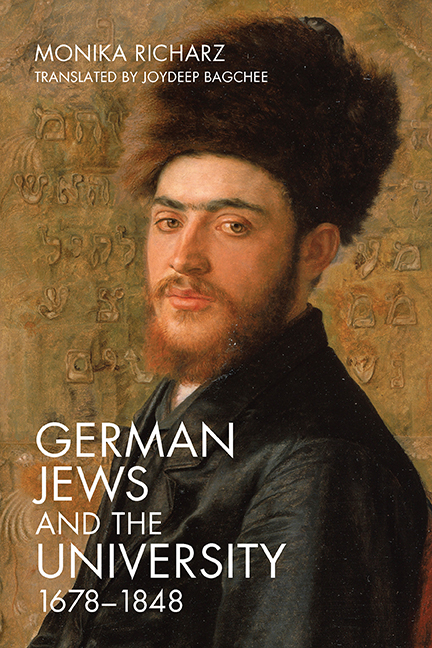Book contents
- Frontmatter
- Dedication
- Contents
- Foreword to the English Edition
- Foreword to the German Edition
- Preface to the German Edition
- Translator’s Note
- List of Abbreviations
- 1 Jewish Education in the Enlightenment Era
- 2 Jewish Encounters with the University before Emancipation
- 3 Jewish Students in the First Half of the Nineteenth Century
- 4 The Social Situation of Jewish Students in the pre-1848 Era
- 5 The Professional Experience of Jewish University Graduates
- Conclusion
- Documents
- Bibliography
- Index
Foreword to the German Edition
Published online by Cambridge University Press: 15 September 2022
- Frontmatter
- Dedication
- Contents
- Foreword to the English Edition
- Foreword to the German Edition
- Preface to the German Edition
- Translator’s Note
- List of Abbreviations
- 1 Jewish Education in the Enlightenment Era
- 2 Jewish Encounters with the University before Emancipation
- 3 Jewish Students in the First Half of the Nineteenth Century
- 4 The Social Situation of Jewish Students in the pre-1848 Era
- 5 The Professional Experience of Jewish University Graduates
- Conclusion
- Documents
- Bibliography
- Index
Summary
TWO HISTORICAL DEVELOPMENTS, above all, laid the ground for the entry of Jews into European culture and society—a process that attained its crowning and, to contemporary observers, apparently irreversible legitimation with dawning political emancipation. The first was the growing role that a small group of German Jews played in the economic life of the eighteenth century. Represented mainly by Jewish bankers and military suppliers employed by German princes as advisors and financiers, this group of so-called court agents amassed wealth and influence by their efforts. The second development resulted from the participation of Jews in German intellectual life. Although summary accounts often date this development to Moses Mendelssohn, in truth, it had already begun to some extent before him. The separation of Jews and their exclusion from European thought has never been as complete as it appears to a schematic glance. Contacts of an intellectual nature had always existed and in the aforementioned layers of financial aristocracy, intimate familiarity with German literature and philosophy had become a reality that would induce a rapid transformation in the intellectual situation of the Jews.
Inevitably, this process of Jews taking an interest in secular education also fostered their inclination towards professional careers. But as in other spheres of life, Jews had to overcome significant resistance in their attempt to gain a foothold in professional occupations. The economic ascent of Jews, beginning with the era of enlightened absolutism and the incipient industrial revolution, has often been studied. But there have only been few detailed studies of Jews’ access to university study and professional occupations. Monika Richarz's book, which emerged from seminar assignments on the history of the Jews in Germany conducted under my direction at the Free University of Berlin, therefore represents a significant step towards filling this lacuna. It is a study of the profound transformation in the Jewish ideal of education, the abandonment of their cultural separation, and the renunciation of the restriction to Talmudic learning, on the one hand, and the simultaneous turn towards university studies and professional careers, on the other. It thus makes a major contribution to the social and intellectual history of Jews in this period.
- Type
- Chapter
- Information
- German Jews and the University, 1678-1848 , pp. xv - xviPublisher: Boydell & BrewerPrint publication year: 2022



